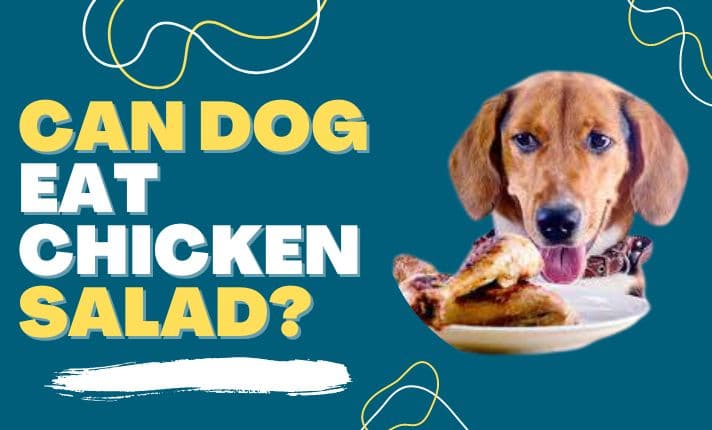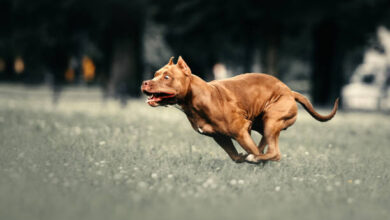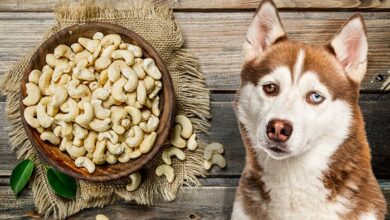Can Dogs Eat Chicken Salad? Ingredients to Watch Out For-2024

Can Dogs Eat Chicken Salad? Chicken is a safe and healthy protein source for dogs when it’s cooked plainly and without any seasonings. Plain, cooked chicken offers lean protein and essential nutrients that benefit your dog.
However, adding seasonings or oils can upset your dog’s stomach and lead to health issues. It’s best to serve chicken unseasoned to keep it a nutritious treat for your furry friend. Let’s explore that- Can Dogs Eat Chicken Salad?
Mayonnaise: Why It’s Not a Good Idea for Dogs
Can Dogs Eat Chicken Salad? Ok , at first while mayonnaise might be a common ingredient in human dishes, it’s best to avoid feeding it to dogs. Here’s why:
1. High in Fat
- Risk: Mayonnaise is loaded with fats, which can easily lead to weight gain in dogs if consumed regularly.
- Health Concerns: The excess fat content can increase the risk of pancreatitis, a serious and painful condition that affects the pancreas and digestion.
2. No Nutritional Benefits
- Empty Calories: Mayonnaise offers no essential nutrients for dogs. It’s calorie-dense but lacks vitamins, minerals, or proteins that could benefit their health.
- Better Alternatives: There are many healthier options, like plain yogurt or pumpkin puree, which provide added nutrients without the excess fat.
3. Health Risks
- Obesity: Regular consumption of mayonnaise can lead to obesity, which is linked to various health problems, such as heart disease, joint issues, and decreased quality of life.
- Digestive Upset: Dogs can also experience stomach discomfort, diarrhea, or vomiting after eating mayonnaise, especially if they’re not accustomed to fatty foods.
Can Dogs Eat Chicken Salad? Mayonnaise is best avoided when it comes to feeding your dog. Instead, opt for healthier alternatives that support their well-being.
Can Dogs Eat Chicken Salad?

Can Dogs Eat Chicken Salad? Ok, When considering feeding your dog chicken salad, it’s crucial to be aware of the ingredients. While chicken might seem harmless, some of the common additions in traditional chicken salad can be dangerous. Two of the most harmful ingredients are onions and garlic, which are highly toxic to dogs. Let’s explore why these ingredients are so dangerous.
Onions and Garlic: Highly Toxic for Dogs
1. Onions
- Toxic Compounds: Onions contain compounds called thiosulfates, which are harmful to dogs. These compounds can destroy red blood cells, leading to anemia.
- Health Risk: Even small amounts of onion, whether raw, cooked, or powdered, can cause health problems in dogs. Over time, regular ingestion can lead to a dangerous condition called hemolytic anemia, which may require urgent veterinary care.
2. Garlic
- Similar Toxicity: Garlic, like onions, contains thiosulfates, making it equally toxic for dogs. Even in small amounts, garlic can have toxic effects, harming their red blood cells.
- Garlic in All Forms: Whether it’s fresh, powdered, or cooked garlic, the risks remain. Some pet owners might believe that a little bit of garlic is fine, but for dogs, even trace amounts can lead to serious health issues.
3. Symptoms to Watch For
- Vomiting and Diarrhea: Dogs that consume onions or garlic might experience immediate digestive problems like vomiting or diarrhea.
- Lethargy and Weakness: As the toxins begin to affect red blood cells, you may notice your dog becoming lethargic or weak. These are signs of anemia and should not be ignored.
- Increased Heart Rate and Pale Gums: More severe cases can lead to an increased heart rate, pale gums, or even collapse. If your dog shows these symptoms, seek veterinary help immediately.
Avoid Chicken Salad with Onions and Garlic
Can Dogs Eat Chicken Salad? Ok, To keep your dog safe, always avoid feeding them chicken salad containing onions or garlic. Even small amounts can be harmful, leading to serious health conditions. Stick to simple, dog-friendly ingredients if you want to share chicken with your pet.
Grapes and Raisins: A Hidden Danger
Can Dogs Eat Chicken Salad? Chicken salad may seem like a harmless snack, but certain ingredients can be dangerous to dogs. One particularly harmful addition is grapes or raisins. These fruits, often included in salads, can pose severe health risks to your furry friend, especially when it comes to kidney function.
1. Toxicity of Grapes and Raisins
- Severe Kidney Failure: Even a small amount of grapes or raisins can lead to acute kidney failure in dogs. The exact toxic component is still unknown, but the effects are well-documented.
- No Safe Amount: It’s important to know that no amount of grapes or raisins is safe for dogs. Whether your dog eats one or several, it can still cause harm.
2. Why Chicken Salad Can Be Dangerous
- Hidden Ingredients: Grapes and raisins are sometimes added to chicken salad for sweetness. This makes traditional chicken salad a risky choice for dogs.
- Accidental Ingestion: Dogs often eat things without us realizing it, and just a few bites of a chicken salad with grapes or raisins could have devastating effects on their health.
3. Symptoms to Watch For
- Vomiting and Diarrhea: Within a few hours of ingestion, your dog may start vomiting or having diarrhea. These are early signs that something is wrong.
- Lethargy and Loss of Appetite: As the toxins affect the kidneys, your dog may become lethargic and lose interest in food. Lethargy and weakness are common signs of kidney problems.
- Increased Thirst and Urination: In more severe cases, you may notice your dog drinking more water than usual or having trouble urinating.
Avoid Chicken Salad with Grapes and Raisins
Can Dogs Eat Chicken Salad? For the safety of your dog, it’s best to avoid feeding them any chicken salad that contains grapes or raisins. These fruits can cause severe kidney damage, and symptoms may not appear until it’s too late. Always check the ingredients before sharing human food with your dog to prevent serious health issues.
Nuts: Not Always Dog-Friendly
Can Dogs Eat Chicken Salad? While plain chicken may seem safe for dogs, many chicken salad recipes include ingredients that aren’t dog-friendly. One such ingredient is nuts, which can range from mildly irritating to dangerously toxic for dogs. Knowing which nuts to avoid is crucial if you’re thinking of sharing a bite of your meal with your furry friend.
1. Macadamia Nuts: Highly Toxic
- Toxic Effects: Even in small amounts, macadamia nuts can be highly toxic to dogs. Symptoms like weakness, vomiting, tremors, and even paralysis can occur.
- No Safe Quantity: Similar to grapes, there is no safe amount of macadamia nuts for dogs. Even a few can cause serious health problems.
2. Walnuts and Pecans: Digestive Issues
- Choking Hazards: Walnuts and pecans are large and can pose a choking risk, especially if not broken down properly.
- Digestive Problems: These nuts are high in fats, which can lead to stomach upset, diarrhea, or even pancreatitis in dogs.
3. High-Fat Content: Health Concerns
- Weight Gain: Nuts are calorie-dense and full of fats. Regular consumption can cause your dog to gain weight or develop other health issues like obesity.
- Pancreatitis Risk: High-fat foods, like nuts, can increase the risk of pancreatitis, a painful condition where the pancreas becomes inflamed.
Skip the Nuts
Can Dogs Eat Chicken Salad? When considering if dogs can eat chicken salad, it’s best to avoid nuts altogether. Whether they’re toxic like macadamia nuts or just high in fat like walnuts and pecans, the risks outweigh the benefits. Stick to dog-safe treats that won’t harm your pup.
Safe Alternatives for a Dog-Friendly Chicken Salad
Can Dogs Eat Chicken Salad? If you want to share chicken salad with your dog, it’s important to avoid harmful ingredients and opt for dog-safe alternatives. With a few simple adjustments, you can make a version that’s safe and even healthy for your pup.
1. Plain, Cooked Chicken
- Why It’s Safe: Chicken is a great source of lean protein, perfect for your dog’s diet.
- How to Prepare: Make sure the chicken is cooked plain, without any seasonings, oils, or sauces that could upset your dog’s stomach.
2. Dog-Safe Vegetables
- Carrots: A low-calorie vegetable that provides vitamins and fiber.
- Green Beans: Another safe option, green beans are packed with nutrients and low in calories.
- Sweet Potatoes: A great source of fiber, vitamins, and minerals, adding extra nutrition to your dog’s meal.
3. Healthier Dressing Options
- Plain Yogurt: A great alternative to mayonnaise, plain yogurt adds creaminess without the extra fat.
- Pumpkin Puree: Low in fat and high in fiber, pumpkin puree can help with digestion and offers a healthy substitute for traditional dressings.
Conclusion: Make It Dog-Friendly
Can Dogs Eat Chicken Salad? By using plain chicken, safe vegetables, and healthy alternatives to mayonnaise, you can create a dog-friendly chicken salad that’s both nutritious and delicious for your furry friend. Always check with your vet before making changes to your dog’s diet, but these alternatives are a great place to start!



